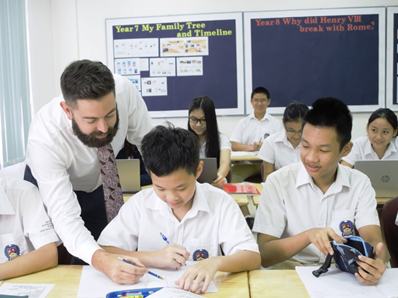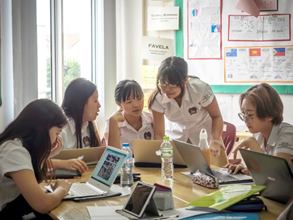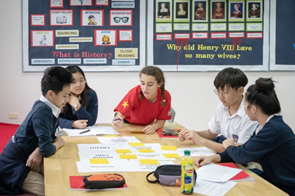Academic curriculum and learning style at international schools are always a worth-discussing topic in education since they are known to be different from local schools.
As for history, a subject generally regarded as a content-heavy course with so many names and dates to memorize, the question of how students study this subject at international schools arouses curiosity among parents.
To find out more about how history is taught as per the international curriculum, we talked to Bradley Minchin, Head of Humanities at the British International School Hanoi (BIS Hanoi), who shared with us how they create an engaging learning experience for students to explore history.
“At BIS Hanoi, History is regarded as an ongoing process of discovery and interpretation in which the students not only study challenging concepts by following the IGCSE (International General Certificate of Secondary Education) but also sharpen their skills through various active learning methods,” Mr. Minchin said.
“We aim to make sure that every history classroom is one that is built with both high ceilings and solid floors.”
High ceilings - stretch and challenge
Mr. Minchin explained that all students are challenged to excel in their learning and have high expectations in terms of their own progress and attainment. With more complex content and concepts from the IGCSE syllabus, students are required to be ambitious in the classroom. They have been exploring the causes of World War 2 and have used critical thinking skills to link and prioritize factors.
Group work is emphasized in history as students are provided opportunities for discussion and debate, which reinforces the idea that history itself is not a “finished product” but an ongoing process of discovery and interpretation.
Specifically, students in Year 8 are enabled to see for themselves how different perspectives on events throw up competing versions of what is “true” about the past. They will evaluate the strength of differing arguments on why the slave trade was abolished, and broaden their understanding of how historians themselves revise what we know about the past in light of new available evidence.
All of these studies closely link to another subject, namely Theory of Knowledge (ToK), which is also a pivotal part in the pursuit of success in IB Diploma Programme.
 |
| Mr Bradley Minchin (left) with his students in a history class. |
Another great thing about the history curriculum is flexibility. There is no prescribed period of history that the teachers have to cover, which means they can choose the most exciting and relevant topics for their students.
For instance, Year 12 and Year 13 students explore a diversity of themes such as Nazi Germany and the Cold War. In addition, they look in details at more advanced controversies in history, e.g. why did Nicholas II survive a revolution in Russia in 1905 but lose his throne in March 1917. These are more open-ended enquiries which require critical thinking and evaluation of different arguments.
Apart from the world history topics discussed in school, it is highly significant and meaningful that the students start from their own past. BIS students are encouraged to learn about their family history to understand more about their ancestors and origins.
“We also advise students to take the chance to learn while traveling, either inside Vietnam or abroad. Those trips allow the children to develop a sense of the past and history in the making,” he added.
Solid floors - support and enable
For those students whose English is not their first language, studying history will help them to improve their language skills and get them ready for tertiary education.
“We adapt and tailor our lessons to ensure that barriers to learning and progress are removed,” Mr. Minchin shared.
All the teachers in the History Department are trained and experienced in teaching students for whom English is an additional language.
“We use the Content and Language Integrated Learning [CLIL] model to plan and deliver lessons so that students’ knowledge and understanding of history are enhanced in tandem with their literacy skills,” he said.
“Doing this involves encouraging our students to practice their English in a range of styles and genres, e.g. news reports, group presentations and debates.”
 |
| Students prepare for a group presentation. |
Moving to BIS Hanoi from domestic schools in South Korea and Vietnam, Jung Eun Ji (Year 13) and Nguyen Ha Minh (Year 11) have seen a refreshing change thanks to history classes.
In the beginning, both of them were struggling with English and only able to understand a small part of the lesson. However, studying in an English-speaking environment, especially in history classes in which they have to do academic reading and writing, Ha Minh and Eun Ji notice themselves an enormous improvement in terms of English language skills.
“We are taught to look at multiple sides of things, analyze sources and elaborate our points in the essays,” Ha Minh said.
“All factors are weighed and taken into consideration in order to achieve a balanced argument. The process ends with our own conclusion that states the most appropriate interpretation. There are not many subjects which allow that much freedom. History teaches us to listen to both sides of the argument and build up reasons for our own verdict.”
For Eun Ji, history lessons at BIS bring her a unique learning experience. Since South Korean schools place a great emphasis on national history, only high school students study world history and this is still an optional subject in their curriculum.
“Here at BIS, I am able to see what happened to the world in the past and share my opinions with classmates who come from various different cultural backgrounds,” Eun Ji said.
Studying history at BIS Hanoi is far beyond simply learning dates and names by heart!
British International School Hanoi
Address: Hoa Lan Road, Vinhomes Riverside, Long Bien District, Hanoi, Vietnam
Mobile: +844 3946 0435/Ext: 222
Website: www.bishanoi.com - Email: bishanoi@bishanoi.com
Fanpage: www.facebook.com/BIS.Hanoi


















































